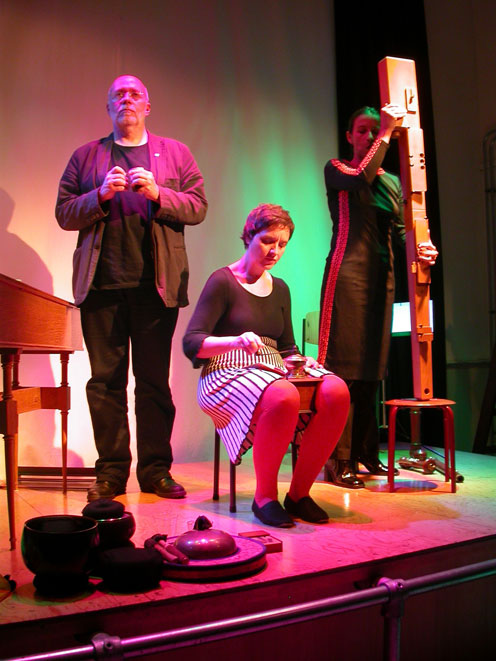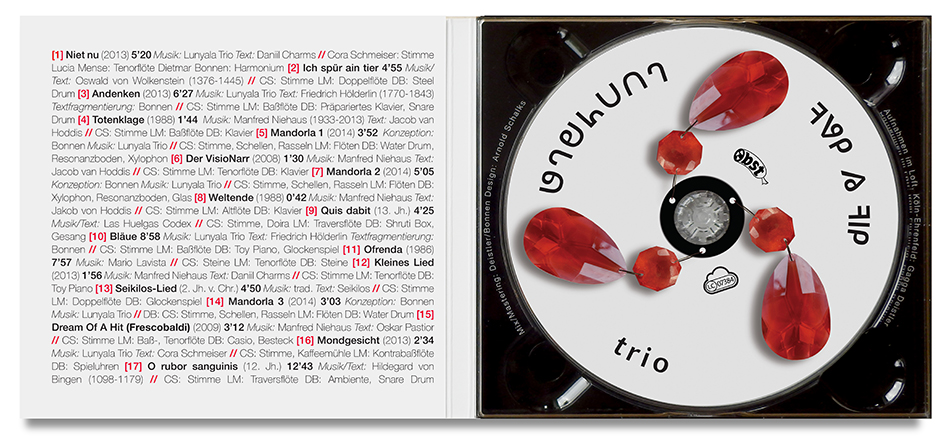dit en dat / LUNYALA TRIO
On this CD, Cora Schmeiser (voice), Dietmar Bonnen (keys and percussion) and Lucia Mense (flutes) mix dadaïsm, contemporary and medieval repertory. Recitation becomes music, sounds become poetry. Kurt Schwitters runs across Saint Hildegard von Bingen, Daniil Charms drops by at Oswald von Wolkenstein and Scardanelli checks out Manfred Niehaus. The trio makes use of vocals, flutes, harmonium, steel drum, xylophone, glockenspiel, toy piano, boulders, glass and coffee grinder. In November 2012, Lucia and Dietmar from Cologne and Cora from Rotterdam met each other during a Klangwerkstatt in the Kolumba Museum in Cologne and decided to convert their shared ideas into sound.

Dietmar Bonnen, Cora Schmeiser, Lucia Mense
Notes to the tracks and sound samples:
[1] Niet nu (2013)
Music: Lunyala Trio Lyrics: Daniil Charms // CS: voice LM: tenor flute DB: harmonium
[2] Ich spür ain tier
Out of fear for the beast of death, Oswald von Wolkenstein (1376-1445) takes stock of his life and requests for redemption. Diabolical flute tones and infernal steeldrum beats accompany his six centuries old song.
[3] Andenken (2013)
Improvisation based on fragmented texts from the late ‘Scardanelli’-period by the German poet Friedrich Hölderlin.
[4] Totenklage (1988) // [6] Der VisioNarr (2008) and [8] Weltende (1988)
Three pieces composed by Manfred Niehaus, based on the poems of Jakob van Hoddis (1887–1942), a German expressionist poet who was 'euthanised' in the Third Reich. The compositions are part of the Manfred Niehaus Pocket Opera.
[5] Mandorla 1 (2014)
Conception: Bonnen music: Lunyala Trio // CS: voice, bells, rattles LM: flutes DB: water drum, sounding board, xylophone
[7] Mandorla 2 (2014)
Conception: Bonnen music: Lunyala Trio // CS: voice, bells, rattles LM: flutes DB: xylophone, sounding board, glass
[9] Quis dabit (13th century)
A planctus (lament) in memory of the death of the abbess of the Las Huelgas convent in Burgos, Spain. The words are derived from the Book of Lamentations by the prophet Jeremiah.
[10] Bläue
Improvisation based on fragmented texts from the late ‘Scardanelli’-period by the German poet Friedrich Hölderlin.
[11] Ofrenda (1986)
The Mexican composer Mario Lavista wrote Ofrenda after the death of a dear friend, following a tradition of the aboriginals of his native country, who accompany their memorial ceremonies with a lament for flute.
[12] Kleines Lied (2013)
Manfred Niehaus (1933-2013) was the main assistent of Bernd Alois Zimmermann, who produced Karlheinz Stockhausen's and John Cage's works for the West Deutsche Rundfunk. Manfred was a member of Gruppe 8; he played in the band of Carla Bley; Jürgen Flimm and Eberhard Feik acted in his theater groups; he was editor for new music for the above mentioned WDR for which he, later on, founded and lead the jazz editorial staff for many years. But above all he was a composer of opera's, concerts, chamber music, choral music, etc. He collaborated with Dietmar Bonnen for 25 years, either as guest members of each others ensembles, or as the half of the Russian-German composer quartett. A few days before he died, Manfred wrote Kleines Lied for the Lunyala Trio. Daniil Charms (1905–1942) was imprisoned in Leningrad because of this poem, which he actually wrote for a children's book. Charms was forgotten due to the Leningrad siege and starved to death.
[13] Seikilos-Lied (2nd century b.C.)
Seikilos is one of the oldest preserved songs. The text with pitch indications were found on a tombstone in Tralles (Asia Minor).
[14] Mandorla 3 (2014)
Conception: Bonnen music: Lunyala Trio // CS: voice, bells, rattles LM: flutes DB: water drum
[15] Dream Of A Hit (Frescobaldi) (2009)
The title of this piece refers to Manfred Niehaus’ insight, that a composition can only become a hit, when all elements are 'quadrangular': four chords and a constant, 16 pulse rythmic motive, in this particular case supporting Manfred's interpretation of Oskar Pastior's text Frescobaldi.
[16] Mondgesicht (2013)
An uplifting story about moonface and sunrays.
[17] O rubor sanguinis (12th century)
Antiphone by Saint Hildegard von Bingen (1098 – 1179).
dit en dat was recorded in the Loft, Cologne-Ehrenfeld.
Gagga Deistler / Dietmar Bonnen - mix / mastering
Gagga Deistler - recording
Arnold Schalks - cover / layout
CD data: P330.41 / DDD / GEMA / OBST 2015 / total time: 79'22
For ordering a cd, please klick here
